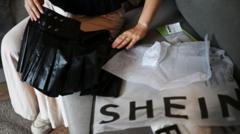The EU has given fast-fashion giant Shein a month to address findings of legal breaches in its consumer practices, including misleading discounts and unsatisfactory product labels, or face financial penalties.
EU Investigates Shein for Misleading Discount Practices

EU Investigates Shein for Misleading Discount Practices
Shein faces scrutiny from the European Union over deceptive marketing tactics, including fake discounts and misleading sustainability claims.
The European Union (EU) has launched an investigation into Shein, a notable Chinese fast-fashion retailer, over concerns of misleading discount practices and other deceptive marketing strategies. The EU has set a deadline of one month for Shein to respond to a report outlining violations of consumer law, otherwise the company could face fines related to its sales across EU nations.
EU Justice Commissioner Michael McGrath emphasized the importance of compliance, stating, “It’s now for Shein to step up, respect the rules and align its practices fully with EU consumer standards.” In response, Shein expressed its commitment to ensuring a safe and enjoyable shopping experience for European consumers.
The investigation unveiled a variety of consumer issues, including false advertising, deceptive labeling of products, misleading sustainability assertions, and insufficiently disclosed contact information. Furthermore, the EU identified tactics such as artificially inflated discounts that did not reflect genuine price history and fabricated urgency to persuade consumers into quick purchases.
The EU has also instructed Shein to ensure that customer reviews and ratings accurately represent consumer experiences without misleading implications. McGrath affirmed, “All companies reaching out to EU consumers must play by our rules,” affirming the EU’s commitment to accountability for e-commerce platforms, regardless of their geographical origins.
This scrutiny is not Shein's first encounter with backlash related to its operational practices. A BBC report from January highlighted troubling working conditions within its supply chain, revealing employees logging 75-hour work weeks contrary to Chinese labor regulations. Lawmakers in the UK criticized Shein for providing unclear responses about the source of its cotton supplies.
In light of these challenges, Shein has reiterated its focus on the ethical treatment of workers and compliance with labor laws, asserting that it is investing significantly to enhance governance in its operations. "We strive to set the highest standards for pay and require that all supply chain partners adhere to our code of conduct," the company stated in its defense.
Despite the ongoing controversies, Shein's popularity among consumers remains remarkably robust, as evidenced by shopper testimonials reflecting commitment to the brand. The unfolding situation continues to spotlight the balance between consumer safety and corporate practices in the fast-fashion industry.



















